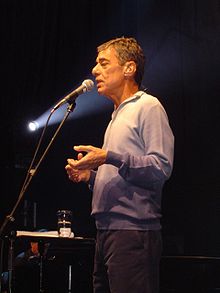- Música Popular Brasileira
-
 Chico Buarque is a leading MPB singer–songwriter.
Chico Buarque is a leading MPB singer–songwriter.
Música Popular Brasileira (Portuguese pronunciation: [ˈmuzikɐ popuˈlaʁ bɾaziˈlejɾɐ], Brazilian Pop Music) or MPB designates a trend in post-Bossa Nova urban popular music. It is not a discrete genre but rather a constellation that combines original songwriting and updated versions of traditional Brazilian urban music styles like samba and samba-canção with contemporary influences: from folk, to rock, to pop, and to jazz. Signifying much more than the sum of the three words would indicate, MPB is a contemporary trend that has brought the world many renowned Brazilian artists, whose individual styles generate trends within MPB. The term can mean either any kind of music with Brazilian origins or a voice and guitar style that arose in the late 1960s. MPB can also be influenced by newer, non-traditional musical trends.
History
MPB, loosely understood as a "style", debuted in the mid-1960s, with the acronym being applied to types of non-electric music that emerged following the advent, ascension and evolution of bossa nova. MPB artists and audiences were largely connected to the intellectual and student population, causing later MPB to be known as "university music" c. 1970.[1][2]
As much as bossa nova, MPB was born out of an attempt to produce a Brazilian "national" music, thus revitalizing traditional styles. MPB made a considerable impact at that time, boosted by several televised music festivals, where the acronym was popularized. The beginning of MPB is often associated with Elis Regina´s interpretation of the mysterious Arrastão, by Vinícius de Moraes and Edu Lobo. In 1965, one month after celebrating her 20th birthday, Elis appeared on the nationally broadcast Festival de Música Popular Brasileira interpreting this song which won the first prize Gold Medal and Elis won the singing prize. Elis recorded Arrastão which became the biggest selling single in Brazilian music history at that time and she became the number one singer, literally overnight. These events officially thrusted MPB as a form before the Brazilian national audience and it was accepted by the public and elaborated on by many artists that followed the trend over the years.
The earliest MPB borrowed elements of the bossa nova and often relied on thinly-veiled criticism of social injustice and governmental repression, being based on progressive opposition to the political scene characterized by military dictatorship, concentration of land ownership, and imperialism. A variation within MPB was the short-lived but influential artistic movement known as tropicália.
References
- ^ UOL, 500 anos de Música brasileira(Portuguese)
- ^ Performance da música indígena no Brasil (Portuguese)
External links
Categories:- Música Popular Brasileira
- Brazilian styles of music
Wikimedia Foundation. 2010.
